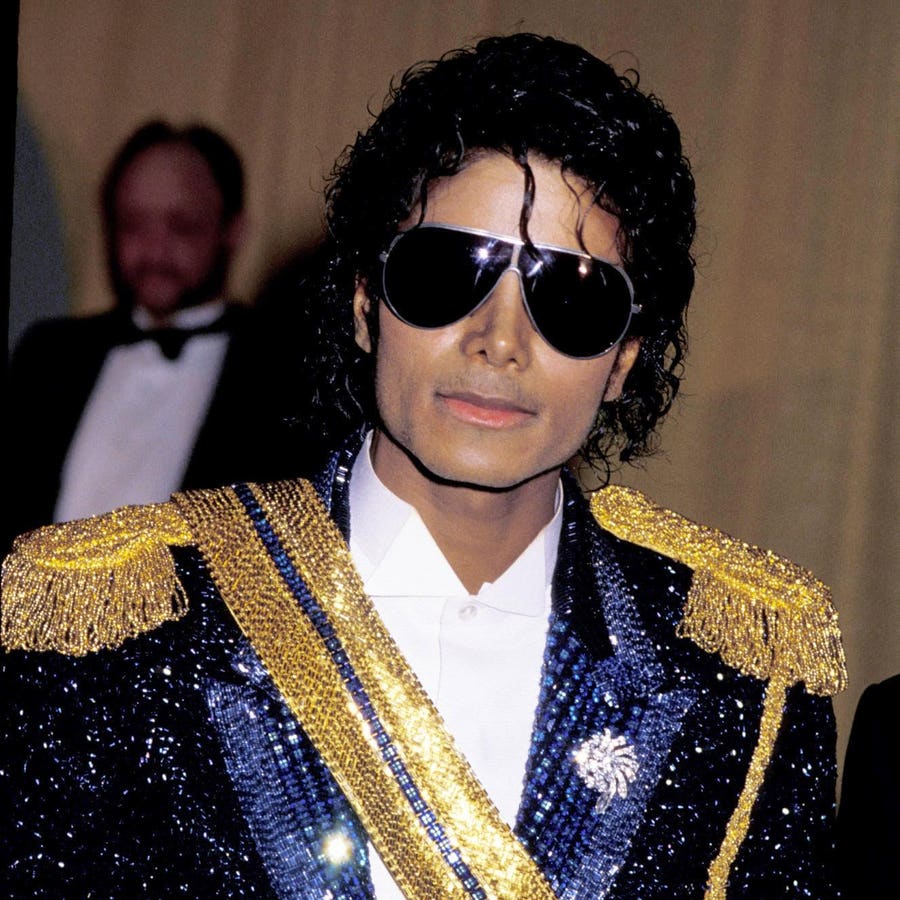It is reasonable to conclude that among all television networks, MTV experienced a particularly mutually beneficial, yet complex relationship with Michael Jackson.
Observers of the wee years of the millennium may recall the events of the 2002 VMAs. Jimmy Fallon was the host that year, and it was also Michael Jackson’s 44th birthday.
The show’s entertainment value skyrocketed when James Brown surprised the crowd and 119.95 million viewers by dancing his way to the stage to his anthem “Get Up (I Feel Like Being a) Sex Machine.” Alongside Fallon, Brown introduced a prime time Britney Spears to the stage, who was slated as a presenter that evening.
“I am thrilled to be here with you in New York on such a special night. And it’s even more special because it just so happens to be someone special’s birthday,” Spears proclaimed, rocking one of her most iconic looks—what British Vogue deems a “dominatrix-inspired” leather regalia.
“This is someone who has inspired me, and just about everybody in this room and the world. I consider him the artist of the millennium. He is a true innovator who pioneered the art of music video, broke down countless barriers, and sold more records than any other artist along the way. So happy birthday, my friend, the King of Pop.”
Do-do-do…do-do-do-do-do…played the trance-friendly instrumental of Jackson’s ’80s era-defining classic “Billie Jean” as the King of Pop angelically walked out to embrace his good friend Spears and accept MTV’s Artist of the Millennium Award. At least, that was the impression Jackson was under.
Jackson received a well-deserved standing ovation before beginning his acceptance speech, during which he acknowledged being the recipient of the Artist of the Millennium Award.
“When I was a little boy in Indiana, if someone had told me that one day I would be getting as a musician the Artist of the Millennium Award I wouldn’t have believed it.”
Imagine being Michael Jackson in 2002. After a successful career as a child star with your brothers in the renowned Jackson 5, embarking on a promising solo career with Off the Wall, and achieving global prestige with the groundbreaking Thriller, which earned Jackson 7 Guinness World Records, a royal title with the Agni people of Ivory Coast, 13 Grammy Awards (including the Grammy Legend Award), and numerous distinguished honors from around the world. It is indeed believable that Jackson was considered an artist of the millennium by 2002, having dominated the scene for three consecutive decades.
There wasn’t actually an “Artist of the Millennium Award.” It was a misunderstanding or, more accurately, a miscommunication. According to a report by The Guardian, a “red-faced” spokesperson for MTV admitted that “some wires got crossed.” In the “Video Music Awards in NYC: A Photo History” posted on MTV.com, the network featured a moment showcasing an image of Jackson in his signature red military-style bedazzled top, with the caption stating, “Michael Jackson mistakenly accepts the imaginary Artist of the Millennium award at the 2002 VMAs,” ultimately acknowledging the miscommunication.
You see, Jackson is a major contributing factor to the growth of MTV. The Michaelmania of the 1980s catapulted the television network to worldwide prominence.
In 1983, Michael Jackson made history by becoming the first Black artist whose music videos received constant replay on MTV. During the early months of 1983, white artists were the primary focus of heavy rotation on MTV, including Phil Collins, Duran Duran, Tom Petty, Def Leppard, and many others, who were, of course, in their prime. This was expected, as MTV was founded as a predominantly rock and roll music network, including related genres such as hard rock, new wave, and heavy metal.
There was an exception when MTV featured the music video of a Black artist. In these instances, there was an undeniable contemporary rock element, or rather a crossover charm, as seen with Musical Youth, Jimi Hendrix, Donna Summer, Herbie Hancock, Stevie Wonder, Kool and the Gang, Tina Turner, and Prince—all of whom were featured on MTV prior to Jackson, but not in any heavy rotation.
It wasn’t until March of 1983, when “Billie Jean” dominated the Billboard charts and reached No. 1 on the Hot 100, that MTV began featuring the music video of a Black artist on heavy rotation. The credit for this shift is attributed to Walter Yetnikoff, the head of Jackson’s international label at the time, CBS Records. Yetnikoff reportedly threatened to withdraw his roster of clients from the popular television network if they continued to refuse to showcase “Billie Jean.” It is clear that the clientele Yetnikoff was referring to were his non-Black artists.
Yetnikoff’s advocacy for the “Billie Jean” music video was not the first instance of someone pushing for a Black artist to be featured on MTV. In 1981, Rick James was enjoying the success of his fifth album, Street Songs, which birthed the era-defining hits “Super Freak” and “Give It To Me Baby.” After successfully persuading Motown to allocate a budget for music videos, James focused on visibility. He became the poster person for Black artist visibility on MTV after launching a campaign against the network for failing to feature Black artists.
“MTV don’t play Rick James, they don’t play Michael Jackson, they don’t play the Commodores, they don’t play Earth, Wind, and Fire, they don’t play Stevie Wonder. Why is that?” James expressed in an interview featured in his posthumous documentary, Bitchin: The Sound and Fury of Rick James. James further remarked, “We are being sat in the back of the bus, television style. This isn’t the Wizard of Oz. There are Black people here, and we make music.”
The funk icon ignited a constructive discourse on the matter. However, James’ widespread criticism of the network—whether at a Billboard Music Video Conference (where he sat on a panel with then Vice President of MTV Gail Sparrow), in an interview with the Los Angeles Times, or in a chat with Ted Koppel—did not work in his favor, as tenured entertainment manager and publicist Ramon Hervey II recounted in their book The Fame Game. Two years later, “Billie Jean” broke the barrier, and James’ eventual silence on the matter allowed his music videos to be featured on MTV.
The following year, 1984, was marked by Michael Jackson mania. Thriller earned Jackson 8 Grammy Awards, 8 American Music Awards, recognition from President Ronald Reagan, an official reunion with his brothers, and Thriller became the best-selling album of all time. Since then, MTV has maintained a close relationship with Jackson. By the age of 26, Jackson was undisputedly a legend.
It was also in 1984 that MTV debuted the inaugural “Video Music Awards” at Radio City Music Hall in New York City, where Thriller—the iconic 14-minute short film directed by John Landis, and the first of its kind—snagged three awards.
Jackson was bestowed the prestigious honor of MTV’s Video Vanguard Award in 1988, and three years later, MTV officially renamed the award after Jackson, officially titling it the Michael Jackson Video Vanguard Award. Jackson’s tight-knit relationship with the network was evident. He delivered a special performance of the Dangerous single, “Will You Be There,” at MTV’s 10th anniversary special, had a special for his Dangerous Tour, The MTV Dangerous Diary in 1992, and gave an unforgettable performance at the 1995 VMAs.
In honor of Jackson’s ninth album, HIStory: Past, Present and Future, on June 16, 1995, MTV rebranded itself as MJTV for one day, recognizing the King of Pop’s undeniable influence on both the network and global music culture.
The mishap at the 2002 VMAs did little to tarnish Jackson’s legacy, even with the comedic yet shabby ridicule by Jimmy Fallon and Jack Black later that evening. The prestigious Video Vanguard Award continued to serve as a symbol of honor for Jackson, even during times of controversy. Although there has never been an official declaration removing Jackson’s name from the moonman award, there have been occasions when the award was presented without the explicit recognition of Jackson’s legacy.
In 2002, Jackson faced one of his last significant moments of public scrutiny when he infamously dangled his son, Prince Michael II, over a hotel balcony in Berlin to show him to cheering fans. This incident triggered a global media frenzy. During the same year, Jackson was also troubled by issues surrounding the promotion of his 2001 album, Invincible, due to disputes with Tommy Mottola, then-president of Sony.
During a press conference that same year with Al Sharpton and the National Action Network, Jackson passionately criticized the music industry, saying:
“Throughout the years, Black artists have been taken advantage of. Completely. It’s time now that we have to put an end to this incredible injustice.”
He further highlighted the financial exploitation of pioneering Black artists:
“People like James Brown to Sammy Davis Jr., some of the real pioneers that inspired me to be an entertainer, these artists are always on tour because if they stop touring they would totally go broke. Record companies really conspire against their artists. They steal, they cheat. They do whatever they can. Especially the Black artists.”
The release of the documentary Living With Michael Jackson the following year led to renewed child molestation charges, of which Jackson was acquitted in 2005. In the interim, the Michael Jackson Video Vanguard Award was presented as the Lifetime Achievement Award to Duran Duran in 2003 and then put on pause for two years. It resumed in 2006 with Hype Williams receiving the Video Vanguard Award. It wasn’t until 2011, two years after Michael Jackson’s impactful death in 2009, that the MTV Video Music Awards officially reinstated “Michael Jackson” into the award’s title, honoring Britney Spears as the recipient.
A similar situation arose in 2019 following the release of Leaving Neverland. However, the network’s response was less definitive. While no official dissociation from Michael Jackson occurred, both recipient Missy Elliott and subsequent honorees continued to acknowledge the award as the “Michael Jackson Video Vanguard Award.” This prestigious honor has been bestowed upon renowned artists throughout Black music culture, including Janet Jackson, LL Cool J, Nicki Minaj, Rihanna, and Kanye West. In 2024, Katy Perry is set to received the award joining the likes of R.E.M, Tom Petty, Red Hot Chili Peppers, Justin Timberlake, Pink, Jennifer Lopez, George Michael and more American music notables.
MTV’s complex yet mutually beneficial relationship with Michael Jackson left an indelible mark on both the network and music history forever. Contemporary artists will forever take pride in being recipients of the award, holding relevant symbolism for Black artists, knowing they are part of a lineage that honors innovation in music and visual artistry, a testament to Jackson’s influence.
Read the full article here





